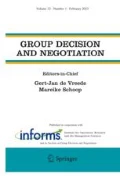Abstract
This paper presents an argumentation-based framework for the modelling of, and automated reasoning about multi-attribute preferences of a qualitative nature. The framework presents preferences according to the lexicographic ordering that is well-understood by humans. Preferences are derived in part from knowledge. Knowledge, however, may be incomplete or uncertain. The main contribution of the paper is that it shows how to reason about preferences when only incomplete or uncertain information is available. We propose a strategy that allows reasoning with incomplete information and discuss a number of strategies to handle uncertain information. It is shown how to extend the basic framework for modelling preferences to incorporate these strategies.
Similar content being viewed by others
References
Amgoud L, Cayrol C (2002) Inferring from inconsistency in preference-based argumentation frameworks. J Autom Reason 29: 125–169
Amgoud L, Prade H (2009) Using arguments for making and explaining decisions. Artif Intell 173(3–4): 413–436
Amgoud L, Maudet N, Parsons S (2000) Modelling dialogues using argumentation. In: Proceedings of the fourth international conference on multi-agent systems, pp 31–38
Amgoud L, Bonnefon JF, Prade H (2005) An argumentation-based approach to multiple criteria decision. In: Proceedings of the eighth European conference on symbolic and quantitative approaches to reasoning with uncertainty (ECSQARU 2005), pp 269–280
Bench-Capon TJM, Dunne PE (2007) Argumentation in artificial intelligence. Artif Intell 171: 619–641
Bonet B, Geffner H (1996) Arguing for decisions: a qualitative model of decision making. In: Proceedings of the 12th conference on uncertainty in artificial intelligence (UAI 1996), pp 98–105
Bonnefon JF, Fargier H (2006) Comparing sets of positive and negative arguments: empirical assessment of seven qualitative rules. In: Proceedings of the 17th European conference on artificial intelligence (ECAI 2006), IOS Press, pp 16–20
Boutilier C (1994) Toward a logic for qualitative decision theory. In: Proceedings of the fourth international conference on principles of knowledge representation and reasoning (KR 1994), pp 75–86
Boutilier C, Brafman RI, Domshlak C, Hoos HH, Poole D (2004) CP-nets: a tool for representing and reasoning with conditional ceteris paribus preference statements. J Artif Intell Res 21: 135–191
Brewka G (2004) A rank based description language for qualitative preferences. In: Proceedings of the sixteenth European conference on artificial intelligence (ECAI 2004), pp 303–307
Brewka G, Benferhat S, Berre D (2004) Qualitative choice logic. Artif Intell 157(1–2): 203–237
Coste-Marquis S, Lang J, Liberatore P, Marquis P (2004) Expressive power and succinctness of propositional languages for preference representation. In: Proceedings of the ninth international conference on principles of knowledge representation and reasoning (KR 2004), pp 203–212
Doyle J, Thomason RH (1999) Background to qualitative decision theory. AI Mag 20(2): 55–68
Dubois D, Fargier H, Perny P (2003) Qualitative decision theory with preference relations and comparative uncertainty: an axiomatic approach. Artif Intell 148: 219–260
Dubois D, Fargier H, Bonnefon JF (2008) On the qualitative comparison of decisions having positive and negative features. J Artif Intell Res 32: 385–417
Dung PM (1995) On the acceptability of arguments and its fundamental role in nonmonotonic reasoning, logic programming and n-person games. Artif Intell 77: 321–357
Huber F (2009) Belief and degrees of belief. In: Huber F, Schmidt-Petri C (eds) Degrees of belief, Synthese Library, vol 342. Springer, Netherlands, pp 1–33
Kaci S, van der Torre L (2008) Preference-based argumentation: arguments supporting multiple values. Int J Approx Reason 48(3): 730–751
Keeney RL, Raiffa H (1993) Decisions with multiple objectives: preferences and value trade-offs. Cambridge University Press, Cambridge
Liu F (2008) Changing for the better: preference dynamics and agent diversity. PhD thesis, Universiteit van Amsterdam
Pollock JL (2001) Defeasible reasoning with variable degrees of justification. Artif Intell 133(1-2): 233–282
Prakken H (2005) A study of accrual of arguments, with applications to evidential reasoning. In: Proceedings of the tenth international conference on artificial intelligence and law (ICAIL 2005), pp 85–94
Prakken H, Sartor G (1997) Argument-based extended logic programming with defeasible priorities. J Appl Non-Class Logics 7: 25–75
Rahwan I, Ramchurn SD, Jennings NR, McBurney P, Parsons S, Sonenberg L (2004) Argumentation-based negotiation. Knowl Eng Rev 18(4): 343–375
Vreeswijk GAW (1997) Abstract argumentation systems. Artif Intell 90(1–2): 225–279
Author information
Authors and Affiliations
Corresponding author
Rights and permissions
About this article
Cite this article
Visser, W., Hindriks, K.V. & Jonker, C.M. Argumentation-Based Qualitative Preference Modelling with Incomplete and Uncertain Information. Group Decis Negot 21, 99–127 (2012). https://doi.org/10.1007/s10726-011-9274-2
Published:
Issue Date:
DOI: https://doi.org/10.1007/s10726-011-9274-2




